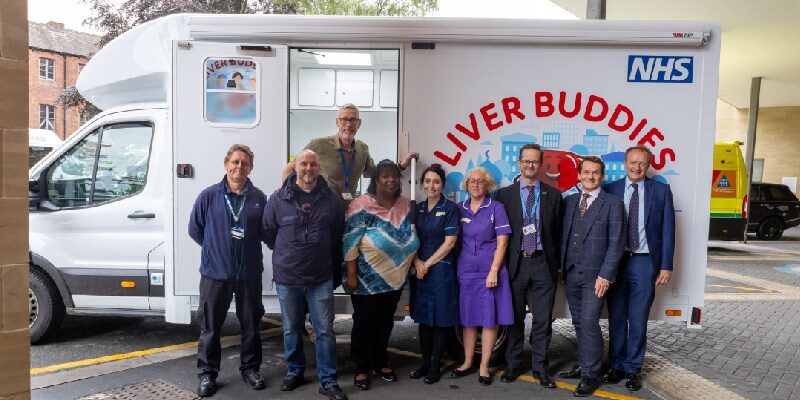
Leeds Teaching Hospitals, on behalf of West Yorkshire Liver Care Operational Delivery Network (WYLCODN), has welcomed a new vehicle to its fleet – ‘O-Liver’ the mobile liver screening unit!
The mobile liver clinic is part of WYLCODN Community Liver Health Checks project which encourages people to receive liver health checks to help detect and diagnose liver cancer early when it is easier to treat.
The project that has been called ‘Liver Buddies’ and the vehicle named ‘O-Liver’ will travel around Leeds and West Yorkshire, including Bradford, Keighley, Wakefield, Halifax and Huddersfield. The teams will visit high risk communities as part of a major NHS drive to catch more cancers earlier and save lives. Checks will be offered to adults with high levels of alcohol consumption, a current or past diagnosis of viral hepatitis or non-alcoholic liver disease, as these are some of the risk factors for developing liver cancer.
Dr Mark Aldersley, Consultant Hepatologist and Clinical Lead for the project, said: “NHS staff are already visiting at-risk communities, but we want to be able to offer more care closer to where our patients are, so they don’t have to come into hospital for checks and to be treated.
“This programme will help us catch cancers earlier, which will make a huge difference to the outcomes for our patients and give them a better chance of surviving the illness.
“We don’t want people to be anxious about getting the care they need. Our mobile liver unit is informal with very friendly staff who will help answer your questions.”
Around 6,100 people are diagnosed with liver cancer each year, but the number of cases has doubled over the past decade and is expected to continue to rise.
Currently only one in three liver cancers are diagnosed at an early stage, but this programme will help catch more cancers earlier, giving patients a much better chance of surviving the illness. If caught early, patients have a 70-90% chance of survival for five years or more with treatment.
Ingrid Ablett-Spence is the programme manager for West Yorkshire and Harrogate Cancer Alliance Optimal Pathway Groups, or OPGs for short. OPGs bring together clinicians from across the area working together to ensure consistency and co-ordination of clinical practice and to achieve the best possible outcomes and experience for patients living with and beyond cancer – irrespective of where they live, their personal circumstances and where their care and treatment is provided.
Ingrid said: “As a Cancer Alliance, we are delighted to see O-Liver on the road, helping to bring liver screening to vulnerable people who may not otherwise access these services.
“The evidence shows us that the earlier that cancer is diagnosed, the greater the chance that it is treatable. The role of O-Liver and the Liver Buddies is therefore a major step forward in tackling the health inequalities faced by these individuals. They may not be affected by cancer at the point of coming into contact with liver screening, but rather are at high risk of developing the disease. This latest development means screening and advice will be available much closer to where they are.
“Tackling unacceptable variations in how cancer prevention, care and treatment is provided is a major element of the role of the Cancer Alliance, and we’ve been delighted to support the ODN in this work. Congratulations to the team on turning their vision into reality.”
Over the next few months, the Community Liver Health Checks Team will be visiting local communities with O-Liver, holding awareness events. The events will be a mix of drop in clinics or by invitation, with local social media campaigns to publicise when and where the events will take place.
Mark Gillyon-Powell is Head of Programme for HCV Elimination at NHS England. He visited the team recently to find out more: “It was a pleasure to visit the team working to improve liver health and eliminate hepatitis C in West Yorkshire on Yorkshire Day. I was shown around their new Mobile Clinic, O-Liver, funded as a part of the national hepatitis C elimination programme. People have complex, busy lives and can’t always access static services, so by taking these services to them rather than asking them to come to us, we’re addressing health inequality gaps in local communities.
He added: “I look forward to seeing O-Liver helping us to address liver disease, identify more people with hepatitis C and eliminate the virus in England in advance of the World Health Organization target of 2030.”